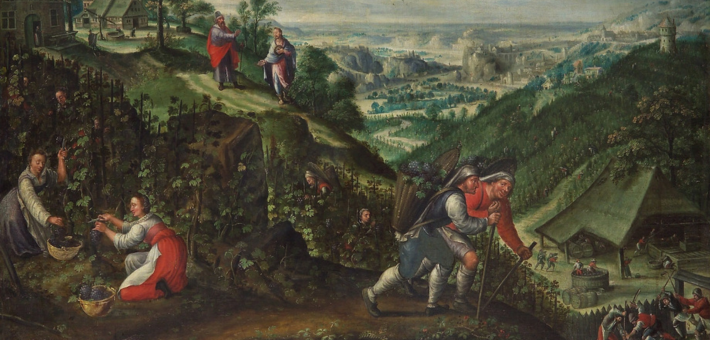Commentary on Matthew 21:33-46
The parable of the Wicked Tenants (21:33-46) is often focused on a Christology or ekklesia-driven allegory in which Jews/Judaism (the original tenants) are replaced with Christians (other tenants). This parable can be better understood in a context where Jesus responds to the chief priests and the elders who questioned his authority (21:23-32). Earlier, he answered them that what is more important is not who has the authority or by whose authority one does but whether one does the will of God. Likewise, in the parable of the Two Sons, he explained why doing the will of God is more important than knowing who God is.
Along the same line, the parable of the Wicked Tenants is told in order to challenge vineyard workers to care for the vineyard with their responsibility. Otherwise, there will be a consequence (judgment) for their negligence. One of the crucial Matthean themes, which is to show God’s impartial love for all until the end, is seen in this parable as well as in other parables such as The Wheat and Weeds and Talents. The point of the parable is not judgment per se but a challenge to people so that they may love all, including enemies, until the end. Surely, judgment follows, but one’s moral drive toward loving all or caring for God’s world is not by punishment or judgment but by the love of God which they received.
In the parable of the Wicked Tenants, Jesus used the imagery of a vineyard planted by the landowner and leased to tenants. The vineyard metaphor is familiar to Jews because it appears in Isaiah 5:1-7 where the vineyard refers to the house of Israel and the people of Judah (Isaiah 5:7). God planted choice vines, but the vineyard yielded wild grapes. Simply, God expected justice and righteousness from them, but they were engaged in bloodshed and injustices. The point of the judgment in Isaiah 5:1-7 is that people did not care for God’s world which must be full of justice and peace. Even though in the parable of the Wicked Tenants, the issue is not about the vineyard itself as opposed to Isaiah 5:1-7, tenants’ failure to take care of the vineyard corresponds to the failure of the vineyard in Isaiah 5:1-7.
Otherwise, the parable is not explicit about the tenants’ work in the vineyard. Did they work hard to get more quality grapes only to take them all from the master’s hands? Or did they not work hard because they were just tenants? In whichever case, they were supposed to settle accounts with the landowner. But they decided to take the vineyard and all inheritance from the master and killed his servants and his son as well. Is this violence acceptable? How can we understand their violence? To explore these questions, we need to see Matthew’s redactional details in the parable as opposed to the same version in Mark 12:1-12 (see also, Luke 20: 9-19).
First, in Mark 12:1-12, simply, a man planted a vineyard and leased it to tenants and went away. But in Matthew, he is called oikodespotes, which means “a master of a house.” While this term frequently appears in Matthew (10:25; 13:27, 52; 20:1, 11; 21:33; 24:43), it seems hard to understand this term from a modern-day context and sensibility because it reflects an abusive master-slave relationship in ancient settings. In Matthew, this term has a double entendre: an abusive hierarchical master in society and a God-like master or king in Matthew’s context. The kingdom of God is compared to a king, who forgives one an incalculable amount of debt (18:23) and invites the marginalized to the wedding banquet (22:2).
Similarly, the kingdom of God is compared to a landowner (oikodespotes) in the parable of the Vineyard Laborers (20:1-16), who is atypical and cares for the unfortunate or weak who joined the vineyard late. He is concerned with full employment, with equitable, just wages promised. He sent all he could find in the labor market into the vineyard. While some scholars see him negatively as one who abused laborers without paying more to people who stayed in the vineyard longer, the point of the lesson is more likely to see the atypical character of this landowner to whom the kingdom of God is compared (20:1).
In the interpretation of a parable, the most important factor is what is compared to the kingdom of God. Here, clearly, “the kingdom of God is like a landowner who went out early in the morning to hire laborers for his vineyard” (20:1). He wants to secure economic justice for all employees. He paid the same to all because he promised the usual daily wage. He did so not to abuse laborers but to ensure that all are paid enough to live on a daily basis. The landowner says he is good (agathos)—not merely generous, as most English versions translate it that way—because he cares about distributive justice for all employees. All are given one denarius, which is the usual daily wage or whatever is right (20:4). Those who came early and worked the whole day were given the right pay as promised. Those who came late to the vineyard and worked fewer hours than others did not expect the same pay with them. But the landowner cared for them because they also needed daily provision. Indeed, they tried to find work earlier but no one hired them. In God’s vineyard, all are invited to work and get paid enough to sustain their daily lives. The landowner ensures that all live in justice and righteousness. That is the kingdom of God realized in the world. Likewise, the landowner in the parable of the Wicked Tenants may be compared to the same kind of landowner as in the vineyard laborers (20:1-16).
Second, Matthew says, “The harvest time had come” in 20:34 whereas Mark says, “The season came” (12:2). The Greek in Matthew for “the harvest time” is ho kairos tōn karpōn, which means the season or time for fruits. Mark simply says tō kairō, which means “at the time of the season.” This difference implies that Matthew emphasizes “the season for fruits,” which is a consistent Matthean theme that one must bear fruits until the end, in good or bad times. Matthew’s wisdom is to recognize that there is a time to work and there is a time for harvest. After the harvest, there is nothing you can do.
Third, Matthew adds the following texts as in verse 43: “Therefore I tell you, the kingdom of God will be taken away from you and given to a people that produces its fruits.” The point here is not an allegory in that Judaism is futile and that the church takes over Israel, but a moral challenge to those who do not do the will of God, which is caring for God’s vineyard. Here again, the importance is in producing fruits. The kingdom of God is not a religion or knowledge, but it is a godly rule or God’s realm to which people must submit every will and every spirit.
Hearing Jesus’ parable, the chief priests and the Pharisees realized that he was talking about them (21:45), but they did not change their minds. In sum, the parable of the Wicked Tenants teaches that God’s people must care for the world, people, and even enemies. As stewards of God’s vineyard, they should not judge others or use them for their benefit but embrace all as their brothers and sisters.



October 8, 2023